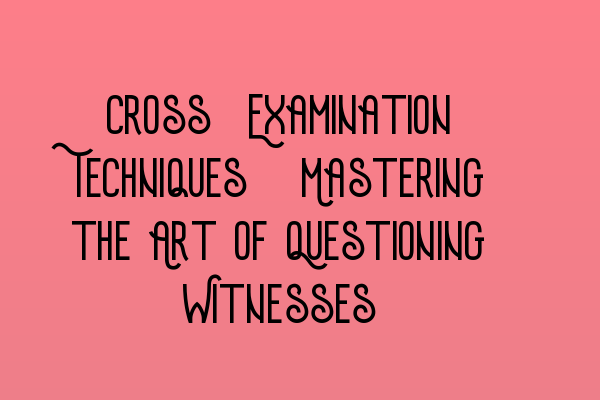Cross-Examination Techniques: Mastering the Art of Questioning Witnesses
Introduction
Cross-examination is an essential skill for any criminal law practitioner. It is the process of questioning witnesses from the opposing side to challenge their testimony and expose any inconsistencies or falsehoods. By mastering the art of questioning witnesses, you can significantly impact the outcome of a case. In this article, we will explore some effective cross-examination techniques that can help you excel in the courtroom.
Prepare and Research
Preparation is the key to successful cross-examination. Before stepping into the courtroom, it is crucial to thoroughly research the case, the witnesses, and any relevant evidence. Familiarize yourself with the witness statements, police reports, and any other documents that may be pertinent to the case. This will allow you to craft effective questions and anticipate the opposing side’s responses.
If you are preparing for the SQE exams, we highly recommend practicing with SQE 1 Practice Exam Questions and SQE 1 Practice Mocks FLK1 FLK2 to familiarize yourself with the types of questions you might encounter.
Establish Credibility
Establishing credibility is crucial during cross-examination. Start by asking simple, non-threatening questions to put the witness at ease and gain their trust. Once you have established a rapport, gradually move on to more challenging questions. Maintaining a confident and respectful demeanor throughout the process will increase your credibility in the eyes of the judge, jury, and even the witness themselves.
Use Open-Ended Questions
Open-ended questions are an effective technique to elicit detailed responses from witnesses. Instead of asking questions that can be answered with a simple “yes” or “no,” opt for questions that prompt the witness to provide more information. This allows you to control the direction of the testimony and gather additional evidence to support your case.
Impeach the Witness
Impeaching a witness involves challenging their credibility or casting doubt on the accuracy of their testimony. This can be accomplished by highlighting any inconsistencies, contradictions, or biases in their statements. Carefully review the witness’s prior statements and compare them to their current testimony. If you discover any discrepancies, use them to undermine the witness’s credibility and weaken their overall impact on the case.
Wrap Up
Mastering the art of questioning witnesses through effective cross-examination techniques requires careful preparation, research, and a deep understanding of the case. By establishing credibility, using open-ended questions, and impeaching witnesses when necessary, you can significantly bolster your chances of success in the courtroom.
If you’re looking to enhance your skills further and prepare for the SQE exams, consider enrolling in our SQE 2 Preparation Courses or SQE 1 Preparation Courses. Stay updated with the latest SRA SQE Exam Dates to plan your exam preparation effectively.
